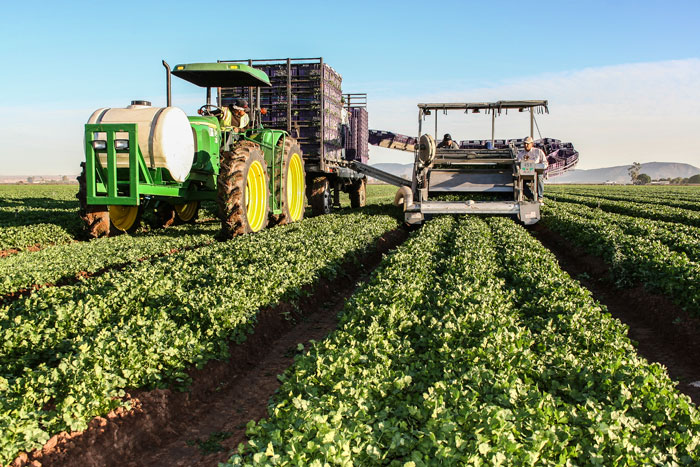
As of late Friday (July 31) the CDC confirmed 358 human cases of Cyclospora from 26 states had been reported with most of them experiencing onset of symptoms on or after May 1. None of those cases were related to international travel, and all are believed to have been exposed by cilantro purchased from retail grocery outlets or at restaurants.

Calling an escalating outbreak of confirmed Cyclospora in the U.S. a "snowballing food-borne illness," the U.S. Centers for Disease Control warns that nearly 400 cases of human contamination in 26 states are believed to be linked to cilantro grown in and imported from Puebla, Mexico.
As of late Friday (July 31) the CDC confirmed 358 human cases of Cyclospora from 26 states had been reported with most of them experiencing onset of symptoms on or after May 1. None of those cases were related to international travel, and all are believed to have been exposed by cilantro purchased from retail grocery outlets or at restaurants.
The majority of those, over 200 cases, originated in the Austin, Texas, area. Another 10 cases have been reported in Wisconsin and multiple cases have also cropped up in Georgia.
As of July 25, the Texas Department of State Health Services had received reports of 182 Cyclosporiasis cases from around the state for 2015. DSHS Officials say this is an alarming number of cases as it may represent a growing trend. Last year, more than 200 Cyclosporiasis cases in Texas were found by DSHS to be associated with cilantro from the Puebla region in Mexico.
In fact, this marks the fourth consecutive year of confirmed Cyclospora cases in the U,S, originating from Mexico. According to FDA, CDC and state public health officials, cases of the illness have been annually recurring with outbreaks reported in 2012, 2013, and 2014 and now in 2015.
CDC reported that 304 people were sickened in the 2014 outbreak and in 2013, a Cyclosporiasis outbreak linked to imported salad mix and fresh cilantro sickened 631 people in 25 states.
Product recall initiated
As a result of CDC findings last week, the U.S. Food and Drug Administration initiated a recall of cilantro originating from the Puebla region after inspectors found evidence of human fecal material and toilet paper in cilantro fields at a farm near Puebla.
FDA reports so far people in an estimated 26 states have been infected with the parasite Cyclospora cayetanensis and have experienced instances of watery diarrhea, nausea, bloating and cramping.
While cilantro from Mexico has been associated with many of the confirmed cases in the U.S. so far, FDA reports investigations are ongoing to identify other specific food items linked to the cases that may not be part of the identified clusters.
Food stores and restaurants in Texas and Arkansas were removing cilantro from their shelves and kitchens as early as Friday as a result of the recall, and stores and retail food outlets in Wisconsin and Georgia were initiating recalls as of this writing.
According to the CDC, people can become infected with Cyclospora by consuming food or water contaminated with the parasite. People living or traveling in countries where cyclosporiasis is endemic may be at increased risk for infection.
The U.S. Food and Drug Administration issued an Import Alert on July 28 for cilantro imported from the Mexican state of Puebla, citing fecal contamination in certain fields and also at processing and packing facilities which American and Mexican public health investigators had inspected.
Unsanitary conditions reported
“Conditions observed at multiple firms in the state of Puebla included human feces and toilet paper found in growing fields and around facilities; inadequately maintained and supplied toilet and hand washing facilities, such as no soap, no toilet paper, no running water, and no paper towels, or a complete lack of toilet and hand washing facilities," the alert stated.
The FDA alert also noted that food-contact surfaces such as plastic crates used to transport cilantro or tables where cilantro was cut and bundled were visibly dirty and unwashed; and water used for purposes such as washing cilantro was vulnerable to contamination from sewage/septic systems.
"In the state of Arkansas we have received reports of two cases of Cyclosporiasis this year. At this time we are not certain they're related to the national outbreak," reported Kerry Krell with the Arkansas Department of Health.
Arkansas health officials say they continue to investigate the source of illnesses in their state.
Public health officials are advising that consumers should wash all produce carefully under running water and warn that consumers and food handlers should wash their hands with soap and water after handling all produce to decrease the risk of contamination.
To learn more about foodborne illnesses, visit http://southwestfarmpress.com/vegetables/food-borne-illness-and-future-farming.
About the Author(s)
You May Also Like



